Memoir frauds raise moral questions
March 6, 2008
The wise Jedi Obi-Wan Kenobi once said, “The truth depends highly on our personal points of view.” But he apparently was lying.
This week showed that the truth is not a malleable substance. Authors Margaret Seltzer and Misha Defonseca admitted this week that both their memoirs are based in fiction.
I pity the Barnes and Noble employees who must now reshelve their inventory, but their concerns are minor when compared to the moral implications of the problem. How can the literary masses trust a modern memoirist again?
In these cases, the severity of their lies is reason for concern. Seltzer’s “Love and Consequences,” describes her life of running drugs in south central Los Angeles. But Seltzer’s sister later exposed their real life, growing up in a suburb and going to private school.
Worse than Seltzer was Defonseca’s fake tale of being raised by wolves after escaping the Holocaust as a little girl. Her story has been translated into 18 languages and made into a feature film in France.
When author James Frey was found to be a fake, Oprah Winfrey brought him on her show until he apologized for allowing her to endorse his book. His career shattered into “A Million Little Pieces,” but Oprah fans felt vindicated and Steadman was relieved.
Still, it feels like the problem has just been apologized away, and how can anyone accept the apology of a liar? If anything, those publishing companies with their editors and rewrites have duped readers as well.
Consumers should demand the reimbursement of book costs coupled with interest for emotional stress. But that won’t happen.
While it is true that the two memoirists did not base their stories in reality, it does not mean their stories lose meaning as fictional accounts. Hasn’t this happened before?
Santa Claus, the Easter Bunny and Milli Vanilli all made people feel good at a certain time, and then the public found them out. Did anyone hate the Wizard when Dorothy pulled the curtain back?
People forget that the truth is a debate for historians, and literature is a battlefield of ideas. No person should ever knowingly deceive another, but if the audience likes the message, perhaps deception has a market.
Maybe reality just isn’t exciting enough for most people, but that doesn’t mean lies should become entertainment.
The line is unfortunately gray. While people may hate liars, they seem to like the lies. Until the matter has been clarified, the court of public opinion is reconsidering the verdict.
Modern reader, take caution. Your opinions may come from the last page of “Cash” by Johnny Cash or the first page of the business section, but take heed of the source.









